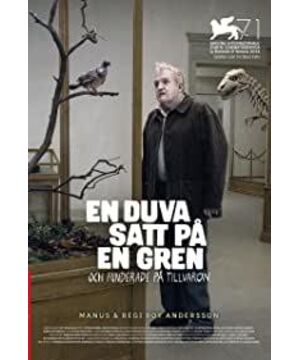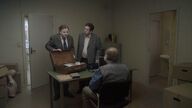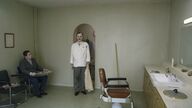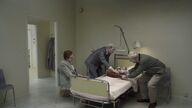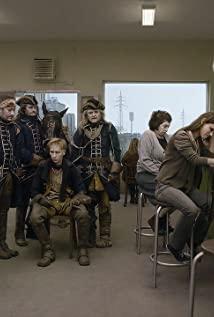"Is it Tuesday?" The question is because it is affirmed, but I want to deny it. The old man of the repair shop opened the door and said, "It's Tuesday again." He told himself and passersby today's date with great certainty, as if it was an existence that could not be changed. The people waiting for the bus on the side of the road seem to have tacitly agreed that today is Tuesday, only the man standing in the middle is a little uneasy, "I thought it was Thursday." Thinking it is a state of doubt, it can be split into two thoughts Path: Today, as others have said, is indeed Tuesday; and as I once remembered, it is Thursday. Look to the left, look to the right, look at the front where no bus passes by, and the person next to you smiles, welcoming a new day on Tuesday, as the old man in the garage said? Or laugh at men for remembering even the simplest date wrong? So, the man also laughed, embarrassedly: "But it feels like Thursday." Behind the embarrassment is self-denial, but he needs to find an excuse to step down. No one knew, and certainly no one would remember that he got the time wrong, and self-denial became self-affirmation: today is indeed Tuesday, and today must be Tuesday.
From Tuesday to Thursday, from negative to positive, how much time has elapsed, and how many reasons for embarrassment exist? "A loss of duration records, there will be chaos." Positive Tuesday, negative Thursday, what's missing? Yes, it's Wednesday. When everyone was sure that today was Thursday after Tuesday, a man suddenly came over to cheer on the bicycle. He cheered himself up, but before leaving, he said to all the people waiting for the car: "It's Wednesday again. "And then rode away. The air freezes there, the smile freezes there, the embarrassment freezes there, Wednesday, filling the space vacated between the old man's Tuesday and the man's Thursday, filling the mix of negation and affirmation, but, "Wednesday again "Is it a record of true duration, or is it a positive negative? There are no calendars, no clocks, and the time is told by every different person. Who is right? Who has gone astray?
No one said anything, no one mentioned the time, silent and awkward, there was a sound, it was the cooing of pigeons, outside the bus, outside the repair shop, in the frame of the scene. Besides, outside of Tuesday, Wednesday, Thursday, it has become a speaker, a watcher, and even a judge—a pigeon sitting on a branch thinking about existence, it uses a special way Look down on those people, look down on this doubt, look down on everyday life. Pigeons are talking, pigeons are thinking. That dove once appeared in the great Netherlandish painter Bruegel the Elder's masterpiece "The Hunter in the Snow", but they didn't call it a dove, they called it a bird. In country life, the bird rested on a branch, Watching a group of hunters returning from hunting. The hunter went out to hunt, but the final result was empty-handed and nothing was found. It was a description of this winter, but the birds clearly felt that it was more like spring, a spring with no harvest. "They are preparing for winter." Birds I saw the hunter, but the hunter didn't see the birds. Looking down on the hunter from the branch is looking down on the life and survival of people, just like hearing about the uncertainty of Tuesday, Wednesday and Thursday, they must think and think at a high place. own survival. Therefore, the bird becomes a thinker, stands taller than man, speaks better than man, and determines the time better than man.
Birds or pigeons cannot be seen, and people cannot understand the meaning of pigeons. The fat girl with Down syndrome did not shy away from the stage, and recited a poem about pigeons. She said, The pigeon fell on the treetops, she said, and it rested and meditated, she said, thinking about the fact that "it has no money," she said, and then it flew away. She finally said that the poem was over. The teacher applauded her courage, the fat girl walked off the stage without a smile, but another naughty boy went up and down the stage, he must have never heard the poem, must not have seen the pigeon thinking, of course Haven't admired the most famous painting.
The pigeon is on the branch, the pigeon will coo, the pigeon thinks about existence, but where is the pigeon? Off-camera Tuesday, Wednesday, or Thursday? In a poem where narrative replaces lyric? Or in a movie made up of 39 scenes? The image of the dove does not appear, but it becomes the subject of a kind of speech. The dove is like the director behind him, like the God looking down, who does not show himself in the thinking of the meaning of existence but always creates the ultimate value. And in this world where pigeons are overlooked and spoken, in the chaos of no recorded duration, only people live there, they ride, cheer, smile, they recite, applaud, mischievous, but always in a kind of embarrassment Encountering real problems, you can't find certain things in embarrassment.
Tuesday, Wednesday or Thursday, where is the real time? In that tavern sat the guests of 1943, the young man in the middle, and in the back were two tables of soldiers, dressed in navy and army uniforms, yes, 1943 was about war, but no guns, only beautiful singing , the waiter was sexy and beautiful, she poured wine into a small glass, and then sang "Song of Glory": "You can drink free beer, if you give a kiss to the girl in the Limping Lotta bar in Gothenburg." When the singing sounded At that time, the soldiers sitting in the back got up and sang "Song of Glory" together, and then came forward in line, kissed, hugged, and took away glasses of wine with the waiter. Looking at their customers, they didn't sing "Song of Glory", they didn't drink free wine, of course they didn't get up, they didn't kiss, they didn't hug, they seemed to be outside of 1943, as if no one had anything to do with the war.
Yes, even in the distant past in 1943, the pub has been around, and later guests have become men drinking alone in lonely corners, the pub is closing, and the waiter puts the chairs on the table, but he doesn't. Drinking there, saying, "I've been greedy all my life, that's why I'm unhappy." No one talked to her, he seemed to be a man left in 1943 who sang "Song of Glory" , who once gave the waiter a kiss and who drank free beer. The later guests also turned into an old man who loved beer but was deaf. The waiter walked up to him and needed to speak to him loudly, so he said tremblingly: Bring me some more beer, and finally when he left with a cane When the waiter put on his coat for him, he also looked like someone who came from 1943 and went through the war? Experienced parting, experienced pain? In a life where time has been rewritten, he can only walk out of the pub alone. Later guests also turned into lost people in military uniforms. He was carrying a leather bag, but he always missed the time. When he was outside the pub, he kept calling others, but the last message was that the party was cancelled. . After three minutes of wandering, he reluctantly disappeared on the street, and this time he entered the pub to listen to a speech, but standing in front of the counter, he missed this speech again, "When I went out, , it was raining heavily, and then I went back to get an umbrella, but there was no umbrella at home, and I went out again and missed the bus, so I had to come over in the rain. But I saw a sign at the door that the speech was canceled. "I didn't catch up. , because he has forgotten things, like time, 1943 has long passed, but he is wearing a military uniform, does he think he is still alive in that time?
Missed the time, missed the era, a military uniform does not bring a sense of belonging, but a sense of lack, this is not 1943, not the war years, not the inevitable time for dating and speeches. But can war and time really be infallible in a continuous record? In another bar, modern decor, modern customers, modern beer, but the door was opened, and two soldiers in ancient decorations came in from the outside, and they gave an order to drive all the female customers inside. and went out, and then passed through the street in groups of cavalry, who were rushing to the front, and the one who entered the bar was the then Swedish King Charles XII, who dismounted from his horse and stepped on the backs of those servants. He poured the water and said in unison, "His Majesty is here." They were the Swedish army, and they were going to war with the Russians. The young king drank soda and suddenly asked the bartender to join their army. "Sleep in Next to the king's tent." Then they set off, gallantly riding to the winning front.
However, when they came back, it was the wounded soldiers. The door of the bar was opened again, but the king on horseback was dying. The country was taken away by the Russians." The soldier said, "If we had enough horses, if it didn't rain that day..." "Did it rain that day?" The question was suddenly unanswered in embarrassment, did it rain that day? The question is because there is no definite time, which day is that day? Is it the day of the expedition? Or the lost day of the soldier who forgot his umbrella and missed the bus and canceled his speech? Horses and uniforms are all part of war, and whether it's Charles XII's army or the waiters who sang "Song of Glory" in 1943, they all seem to have met that indeterminate battle in their bellicose days. Rain, then failure, miss, and embarrassment turns to absurdity when the desire to win finally turns into the crying woman in the "Widow's Veil Will Be Your Gift" song.
The existence of the absurd is to turn man into a tool, life and death, love and hate, victory and defeat, or a reality that doesn't know if it's Tuesday or Thursday, maybe even Wednesday. So when the "Trilogy of Humanity" came out in the form of "Death Date", there was only hypocrisy and loneliness, only cruelty and tragedy. In the scene of three death dates, a man prepares a table of good dishes with his wife in the snowy winter. He stands for a while, and then intends to open the bottle of wine, but he can't open it. He uses his legs to clamp it. It seemed that there was nothing he could do, and in the end, he stroked his chest and fell silently to the floor, while his wife in the kitchen prepared other delicacies on her own; the old man in the hospital grabbed the She only brought a bag from home, which contained jewelry, jewelry and 70,000 yuan of money. She asked her daughter to bring it to heaven, but the son who came in said to her, "You are going to heaven. Now, papa is waiting for you there, you can't go with this money." He came to take the bag from her hand, but the old man refused, and a fight broke out on the last day of the old man's life; on a ferry , A customer who paid for shrimp sandwiches and beer suddenly suffered a heart attack and fell to the ground, dying. The waiter asked, "He paid, what should I do with these things?" Then she looked at the people who stood and watched this happen. The customer said, "Who do you want beer?" A fat man came up, took the glass of beer, and drank it himself.
The three death scenes, or all of them are related to greed, in a process of indifferent husband and wife, mother-son competition and free drinking, death has no dignity, not only embarrassingly expressing human nature, but also becoming the most ruthless to human existence. deconstruct. The embarrassment of war, the loss of time, and the lowliness of death all turned into irony in absurdity, and when King Charles XII of Sweden became history, when 1943 became history, how people in the real sense find their way to survive. significance? In fact, in the confusion of time, whether it is history or reality, it has become a scene of pigeons looking down. In this hypocritical, lonely and cruel existence, Sam and Jonathan seem to be the only people who live in a realistic sense with their own names. They saw the scene of Charles XII's expedition and the men in military uniforms. The lost back saw the protagonists who met with death, but after seeing them, they also fell into a truly embarrassing and absurd existence.
They are a pair of salesmen who sell hilarious products like "Vampire Teeth" and "Uncle One Tooth Mask", but no one will buy their stuff other than they themselves put on him and make a little laugh, they enter A stationery sales point, the boss said, our store does not need it; they sell products to ask for money, but the woman conveys her husband's opinion: we have no money; Pay it back in a week!" They were forced by life, and those funny toys couldn't make them laugh, they got lost, they cried, they were trapped in a reality of powerless struggle, and Jonathan often had some terrible dreams, he had a hunch Until I meet my parents in heaven. In the cheap hotel, Jonathan's dream seemed terrifying, a large group of black men had been driven into the huge copper pillar by the soldiers, then the door was closed, the fire was lit, and the fire was raging under the copper pillar, and the people inside seemed to be Being roasted, this is a kind of inhuman torture, but there are all kinds of horns on the outside of the copper pillar, so the screams inside finally become a kind of beautiful music, and in the music, those on the opposite side are The bereaved elders held wine glasses in their hands and celebrated as if they were watching a performance.
Soldiers and slaves, burning and death, the bronze pillar with the inscription "Politon" is also a symbol of Swedish tragedy, a company that discovered gold mines, but has been doing evil things, and in Jonathan's In the dream, it even became a symbol of national shame. Those black slaves were roasted, but their screams were replaced by a kind of music. Is it the cruelty of war or the annihilation of humanity? And these are "terrible things" in Jonathan's view. They have happened in history and in reality, and everyone can't escape such enslavement and such tragedies. And in the huge metaphor that dreams are reality, those 39 unrelated scenes slowly turned into a group image of existence: two salesmen entered the restaurant, sitting next to a customer who was drinking beer, he Just escaped from a barber shop whose owner had resigned from a 15-year-old ferry, "due to dizziness." And there was a sudden death of a client with a heart attack on that ferry; the salesman listened to the military The experience of being canceled from the speech, in the restaurant where the military once passed, the customers were seated, on one side was the son who was fighting with his mother for a purse in the hospital, and on the other side was the fat flamenco dancer and the man she molested. Young people... They are all interspersed in different scenes, each other has an unknown story, and it seems that it is difficult for each of them to escape the predicament of existence. But in the face of this predicament, the only thing they can comfort others, and comfort themselves may be the words: "I'm glad to hear that you are fine." The
dance teacher harassed the male students. When the male students left angrily, they called outside the door. The cleaner said it; the ferry captain said it while standing there answering the phone before he cut someone's hair; the husband and wife were at home, the husband was sitting at the table, and the wife was on the phone in the kitchen; the one with a gun in one hand Holding the phone, the man who repented also said it; the staff member who experimented with monkeys also said it when he called into the window..."I'm glad to hear you're fine" is said in different scenes , but they were all on the phone, in stories where they couldn't see each other, as if they were comforting someone who was absent, and in this comfort, they were even absent themselves.
Today is Tuesday? Is it Thursday? Or Wednesday? The conquest and defeat of Charles XII, the song and beer of 1943, the death and sales of reality, it is a scene of bizarre, absurd, grim, humorous, alienating, but also a connected existence, and the dove is On the branch, a cooing cry, or not for speech, not a revelation, because for it, it can fly away at any time, but in this lonely and absurd world, in this false and mutated world In life, people still need a hope for survival, two girls blowing bubbles on the balcony, a baby sitting on a stroller being kissed by a fat woman on their feet, and a couple lying on the beach far away from the city, or they are forgotten, not into history, not into dreams, not into taverns, but in oblivion they can grow independently, but they can escape the absurd, but can really be sure that today is Tuesday, Wednesday, Thursday, but can not call Really say something in the future: "I'm glad to hear you're fine."
View more about A Pigeon Sat on a Branch Reflecting on Existence reviews


